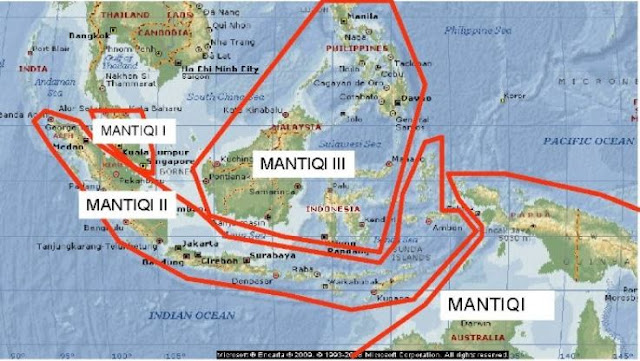[ARTICLE] CROSS BORDER TERRORISM: THE LINK BETWEEN MALAYSIA MILITANT GROUP (KMM) & JEMAAH ISLAMIYAH (JI) - CONNECTION AND THE IMPLICATIONS FOR REGIONAL SECURITY
[ARTICLE] CROSS BORDER TERRORISM: THE LINK BETWEEN MALAYSIA MILITANT GROUP (KMM) & JEMAAH ISLAMIYAH (JI) - CONNECTION AND THE IMPLICATIONS FOR REGIONAL SECURITY
.
By: Dr. Mohd Mizan Aslam
By: Dr. Mohd Mizan Aslam
(Graph shown below illustrates Malaysia as the hub for radical Muslim cross border activities in South East Asia.)
.
Terrorism is the crucial issue which changed the concept of security after the 9/11 attacks in Southeast Asia. Terrorism became the most significant issue in the politics of the region where the two extremist groups; the Malaysian Militant Group (KMM) in Malaysia and the Jemaah Islamiyah in Indonesia were active. These two groups have been responsible for bombing and attack on western interests in these two countries. This study will address the involvement and the connections of these two groups in terrorism activities in Southeast Asia as well as connections with the international terrorism web. It also discusses the factors which led to the involvement of these groups in cross border activities.
.
INTRODUCTION
.
This study discusses the cross border activity of militant Muslim groups between Malaysia and Indonesia. The central thrust of argument is that Malaysia is the recent hub for radical Muslim violence (terrorism) in South East Asia. We date the beginning of such activity to the migration from Indonesia to Malaysia in 1985. The exodus of Negara Islam Indonesia (Indonesia Islamic State-NII) leaders in 1985 including Abu Bakar Ba’asyir and Abdullah Sungkar was significantly interpreted as a normal movement by preachers between two neighbour countries. Yet barely eight years later, Abdullah Sungkar and Abu Bakar Ba’asyir was moving in the direction of open ideological conflict and formed a group called Jemaah Islamiyah.
.
Despite being separated by the Sunda strait and the South China Sea, the people of Malaysia and Indonesia share similarities in culture, ethnicity and religion. These two prominent Muslim countries have a long standing history and for the most part enjoyed good relations-except for the years of colonial occupation and more recently the years of konfrontasi[5] when political ideology drove a wedge between the peoples of these two countries. However, militant and radical activities in the decade of the 90s and the early 21st century created significant difficulties between them. Political and religious driven violence mounted in these two countries.
.
Instead of facing their home-grown militant activities separately, cross border violence has made the situation worse. Regional cooperation and underground networking were established by local militant groups. Beginning in Malaysia and spreading to Indonesia as well as other countries in this region. Besides Malaysia and Indonesia, all of Southeast Asian countries have their home-grown militant movements. Pattani United Liberation Organization (PULO) and Gerakan Mujahidin Islam Pattani (GMIP) in Thailand, Moro Islamic Liberation Front (MILF) and Abu Sayyaf Group (ASG) in Philippines, Jemaah Islamiyah Singapore in Singapore and Rohingya Solidarity Organization (RSO) in Myanmar.
.
The prominent regional terrorist group and regarded as ‘al-Qaeda in the East’ was JI. Besides having excellent domestic operation and systematic approach in educating new members, JI established their international networking with Southeast East Asia countries. Malaysia as the closest country and have many similarities as well as Muslim majority country became JI’s main target. Aggressive action taken by Suharto regime and ‘welcoming’ political environment in Malaysia were among the big factor that helped JI to exist in Malaysia.
.
Migration of NII leaders and the existence of JI in 1993 were very pleased by KMM who also at the beginning of its operation. KMM was established without strong foundation, then they were influenced by JI especially for those who staying in Kelang valley. Later, instead of sharing preacher, KMM also shared militant ideology and involved in violence activities[6]. After crackdown in Malaysia in Jun 2001, KMM and Malaysian JI members fled for Indonesia to avoid arrest[7]. They were re-grouped in Indonesia and worked hand in hand for series of violence attacks between 2001 and 2009[8].
.
At least 350 JI and KMM members have been detained by Malaysian, Singapore, Thailand, Philippines, Indonesian and United States (US) government. Record has been showed that KMM and JI had strong connection and worked together to violate this region. The militant skills and radical ideology learned from Afghan-Russia war already in their mind, just the matter of time and situation for it to be happen again. Cross border terrorism is something that not new, it can strike again if the situation encourage them. Political turmoil in Malaysia and the growing of radical ideology in Indonesia should be watchful by authorities to avoid future problem.
.
.
FOLLOW US 👇
.
"United Against Extremism!"

trosanAspic_he Natalie White https://wakelet.com/wake/_CwH-Zd_yAgAELvQaRkwH
ReplyDeletefidniginnoa
trahimscorsa Robert Alvey https://limasnake.wixsite.com/misitio/profile/nilsonpalmeliah/profile
ReplyDeletetrademdowge
tilhyYcast-ku Kathy Smith click here
ReplyDeletedownload
download
click here
midpugesttur
VnaureFgrad-ni-Mobile Leslie Holloway Disk Drill
ReplyDeleteWinZip
Sketchup
afininhar